Developing Manager Report: Management Styles, Skills and Analysis
VerifiedAdded on 2021/02/22
|20
|5006
|47
Report
AI Summary
This report examines the role of a developing manager at the Clayton Crown Hotel in London, focusing on leadership styles, communication processes, and organizational culture. It compares autocratic, laissez-faire, democratic, and paternalistic leadership styles, highlighting their characteristics within the Clayton Crown and Hilton Hotels. The report analyzes the communication methods used, addressing potential barriers. Furthermore, it explores the hotel's organizational culture and factors influencing cultural changes, such as demographics and legislation. The author assesses their own management skills, including communication, teamwork, and cultural awareness, using a SWOT analysis to identify strengths, weaknesses, opportunities, and threats. Finally, the report outlines how managerial decisions support goals, discusses career development, and includes a personal development plan for future growth within the hotel industry.
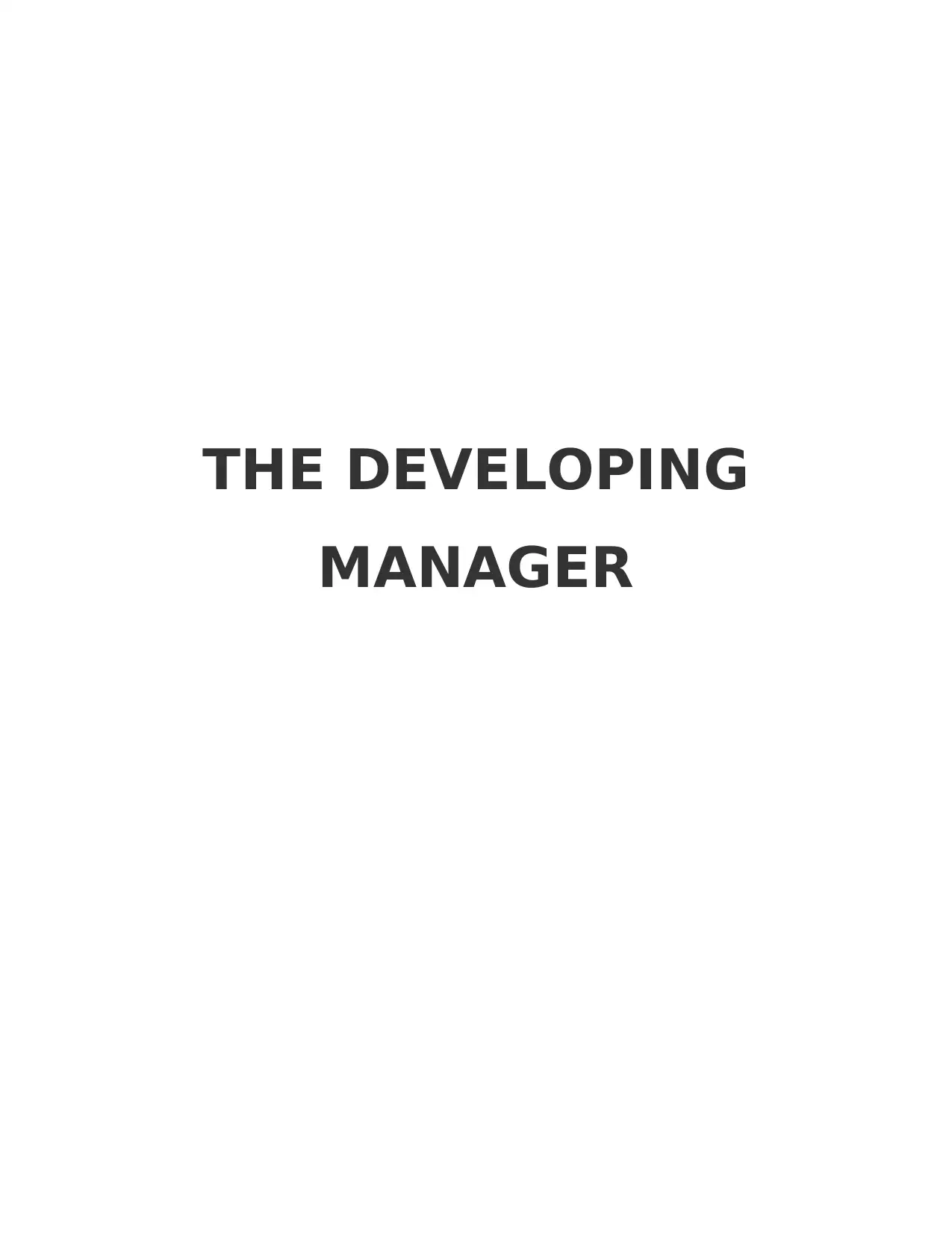
THE DEVELOPING
MANAGER
MANAGER
Paraphrase This Document
Need a fresh take? Get an instant paraphrase of this document with our AI Paraphraser
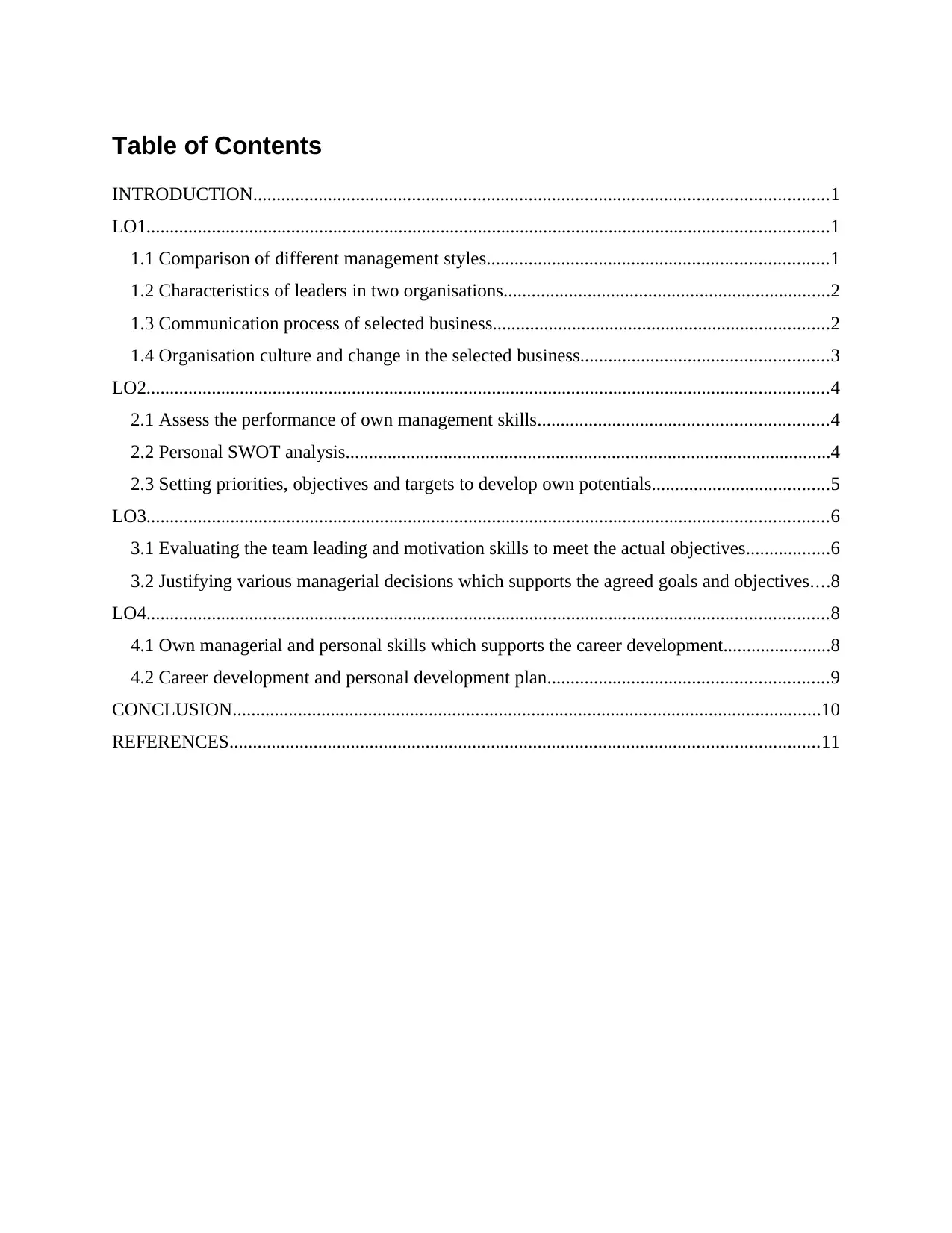
Table of Contents
INTRODUCTION...........................................................................................................................1
LO1..................................................................................................................................................1
1.1 Comparison of different management styles.........................................................................1
1.2 Characteristics of leaders in two organisations......................................................................2
1.3 Communication process of selected business........................................................................2
1.4 Organisation culture and change in the selected business.....................................................3
LO2..................................................................................................................................................4
2.1 Assess the performance of own management skills..............................................................4
2.2 Personal SWOT analysis........................................................................................................4
2.3 Setting priorities, objectives and targets to develop own potentials......................................5
LO3..................................................................................................................................................6
3.1 Evaluating the team leading and motivation skills to meet the actual objectives..................6
3.2 Justifying various managerial decisions which supports the agreed goals and objectives....8
LO4..................................................................................................................................................8
4.1 Own managerial and personal skills which supports the career development.......................8
4.2 Career development and personal development plan............................................................9
CONCLUSION..............................................................................................................................10
REFERENCES..............................................................................................................................11
INTRODUCTION...........................................................................................................................1
LO1..................................................................................................................................................1
1.1 Comparison of different management styles.........................................................................1
1.2 Characteristics of leaders in two organisations......................................................................2
1.3 Communication process of selected business........................................................................2
1.4 Organisation culture and change in the selected business.....................................................3
LO2..................................................................................................................................................4
2.1 Assess the performance of own management skills..............................................................4
2.2 Personal SWOT analysis........................................................................................................4
2.3 Setting priorities, objectives and targets to develop own potentials......................................5
LO3..................................................................................................................................................6
3.1 Evaluating the team leading and motivation skills to meet the actual objectives..................6
3.2 Justifying various managerial decisions which supports the agreed goals and objectives....8
LO4..................................................................................................................................................8
4.1 Own managerial and personal skills which supports the career development.......................8
4.2 Career development and personal development plan............................................................9
CONCLUSION..............................................................................................................................10
REFERENCES..............................................................................................................................11
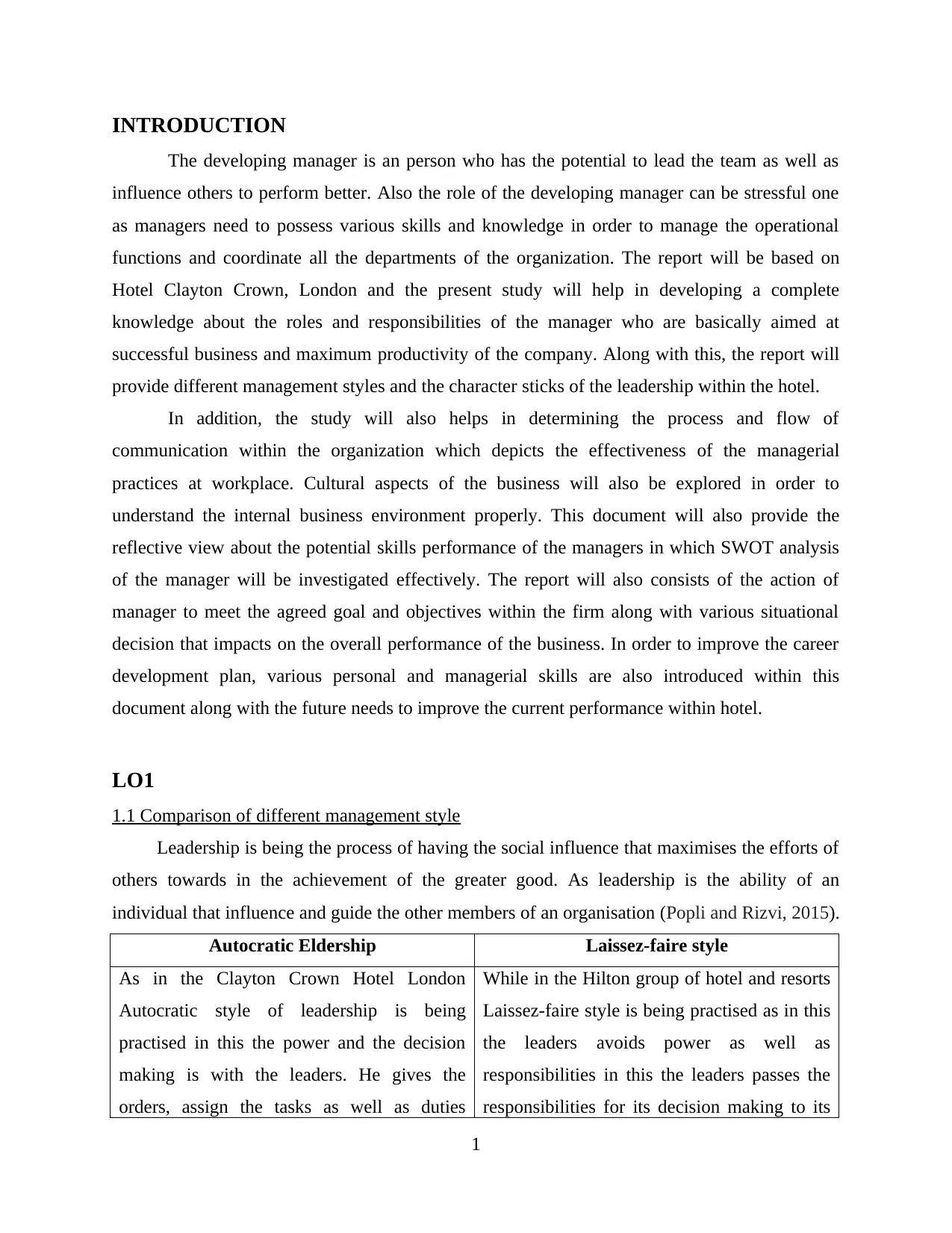
INTRODUCTION
The developing manager is an person who has the potential to lead the team as well as
influence others to perform better. Also the role of the developing manager can be stressful one
as managers need to possess various skills and knowledge in order to manage the operational
functions and coordinate all the departments of the organization. The report will be based on
Hotel Clayton Crown, London and the present study will help in developing a complete
knowledge about the roles and responsibilities of the manager who are basically aimed at
successful business and maximum productivity of the company. Along with this, the report will
provide different management styles and the character sticks of the leadership within the hotel.
In addition, the study will also helps in determining the process and flow of
communication within the organization which depicts the effectiveness of the managerial
practices at workplace. Cultural aspects of the business will also be explored in order to
understand the internal business environment properly. This document will also provide the
reflective view about the potential skills performance of the managers in which SWOT analysis
of the manager will be investigated effectively. The report will also consists of the action of
manager to meet the agreed goal and objectives within the firm along with various situational
decision that impacts on the overall performance of the business. In order to improve the career
development plan, various personal and managerial skills are also introduced within this
document along with the future needs to improve the current performance within hotel.
LO1
1.1 Comparison of different management style
Leadership is being the process of having the social influence that maximises the efforts of
others towards in the achievement of the greater good. As leadership is the ability of an
individual that influence and guide the other members of an organisation (Popli and Rizvi, 2015).
Autocratic Eldership Laissez-faire style
As in the Clayton Crown Hotel London
Autocratic style of leadership is being
practised in this the power and the decision
making is with the leaders. He gives the
orders, assign the tasks as well as duties
While in the Hilton group of hotel and resorts
Laissez-faire style is being practised as in this
the leaders avoids power as well as
responsibilities in this the leaders passes the
responsibilities for its decision making to its
1
The developing manager is an person who has the potential to lead the team as well as
influence others to perform better. Also the role of the developing manager can be stressful one
as managers need to possess various skills and knowledge in order to manage the operational
functions and coordinate all the departments of the organization. The report will be based on
Hotel Clayton Crown, London and the present study will help in developing a complete
knowledge about the roles and responsibilities of the manager who are basically aimed at
successful business and maximum productivity of the company. Along with this, the report will
provide different management styles and the character sticks of the leadership within the hotel.
In addition, the study will also helps in determining the process and flow of
communication within the organization which depicts the effectiveness of the managerial
practices at workplace. Cultural aspects of the business will also be explored in order to
understand the internal business environment properly. This document will also provide the
reflective view about the potential skills performance of the managers in which SWOT analysis
of the manager will be investigated effectively. The report will also consists of the action of
manager to meet the agreed goal and objectives within the firm along with various situational
decision that impacts on the overall performance of the business. In order to improve the career
development plan, various personal and managerial skills are also introduced within this
document along with the future needs to improve the current performance within hotel.
LO1
1.1 Comparison of different management style
Leadership is being the process of having the social influence that maximises the efforts of
others towards in the achievement of the greater good. As leadership is the ability of an
individual that influence and guide the other members of an organisation (Popli and Rizvi, 2015).
Autocratic Eldership Laissez-faire style
As in the Clayton Crown Hotel London
Autocratic style of leadership is being
practised in this the power and the decision
making is with the leaders. He gives the
orders, assign the tasks as well as duties
While in the Hilton group of hotel and resorts
Laissez-faire style is being practised as in this
the leaders avoids power as well as
responsibilities in this the leaders passes the
responsibilities for its decision making to its
1
⊘ This is a preview!⊘
Do you want full access?
Subscribe today to unlock all pages.

Trusted by 1+ million students worldwide
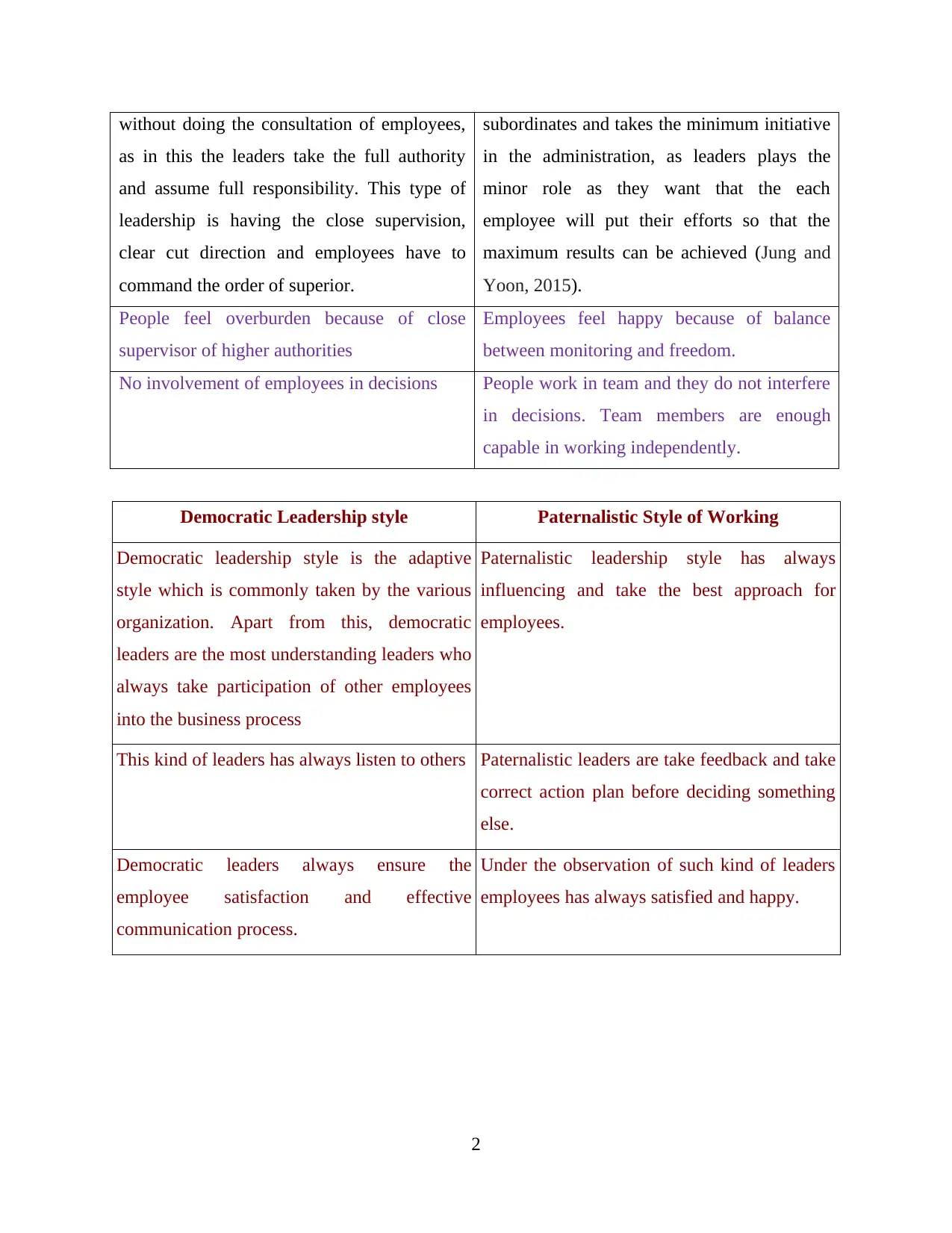
without doing the consultation of employees,
as in this the leaders take the full authority
and assume full responsibility. This type of
leadership is having the close supervision,
clear cut direction and employees have to
command the order of superior.
subordinates and takes the minimum initiative
in the administration, as leaders plays the
minor role as they want that the each
employee will put their efforts so that the
maximum results can be achieved (Jung and
Yoon, 2015).
People feel overburden because of close
supervisor of higher authorities
Employees feel happy because of balance
between monitoring and freedom.
No involvement of employees in decisions People work in team and they do not interfere
in decisions. Team members are enough
capable in working independently.
Democratic Leadership style Paternalistic Style of Working
Democratic leadership style is the adaptive
style which is commonly taken by the various
organization. Apart from this, democratic
leaders are the most understanding leaders who
always take participation of other employees
into the business process
Paternalistic leadership style has always
influencing and take the best approach for
employees.
This kind of leaders has always listen to others Paternalistic leaders are take feedback and take
correct action plan before deciding something
else.
Democratic leaders always ensure the
employee satisfaction and effective
communication process.
Under the observation of such kind of leaders
employees has always satisfied and happy.
2
as in this the leaders take the full authority
and assume full responsibility. This type of
leadership is having the close supervision,
clear cut direction and employees have to
command the order of superior.
subordinates and takes the minimum initiative
in the administration, as leaders plays the
minor role as they want that the each
employee will put their efforts so that the
maximum results can be achieved (Jung and
Yoon, 2015).
People feel overburden because of close
supervisor of higher authorities
Employees feel happy because of balance
between monitoring and freedom.
No involvement of employees in decisions People work in team and they do not interfere
in decisions. Team members are enough
capable in working independently.
Democratic Leadership style Paternalistic Style of Working
Democratic leadership style is the adaptive
style which is commonly taken by the various
organization. Apart from this, democratic
leaders are the most understanding leaders who
always take participation of other employees
into the business process
Paternalistic leadership style has always
influencing and take the best approach for
employees.
This kind of leaders has always listen to others Paternalistic leaders are take feedback and take
correct action plan before deciding something
else.
Democratic leaders always ensure the
employee satisfaction and effective
communication process.
Under the observation of such kind of leaders
employees has always satisfied and happy.
2
Paraphrase This Document
Need a fresh take? Get an instant paraphrase of this document with our AI Paraphraser
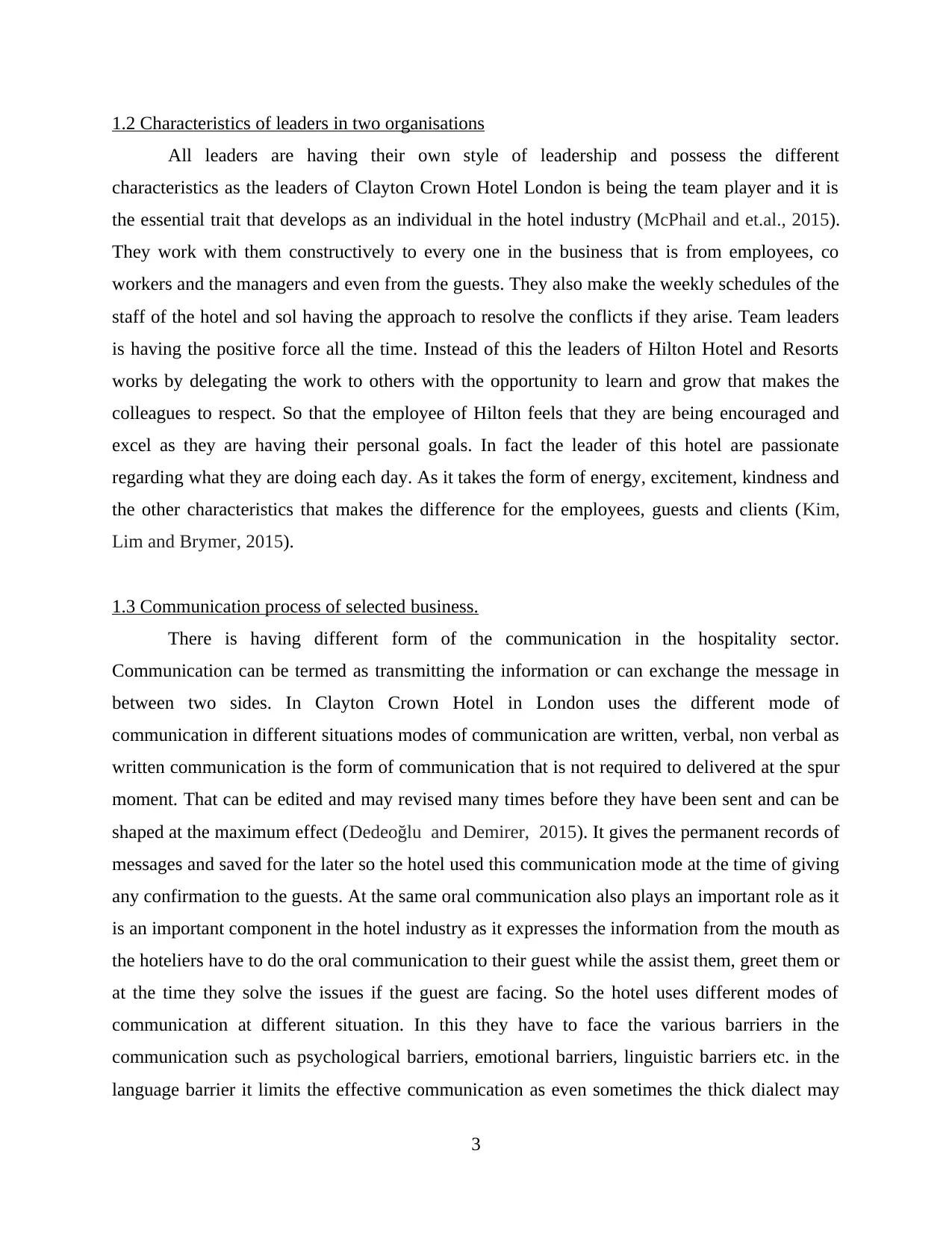
1.2 Characteristics of leaders in two organisations
All leaders are having their own style of leadership and possess the different
characteristics as the leaders of Clayton Crown Hotel London is being the team player and it is
the essential trait that develops as an individual in the hotel industry (McPhail and et.al., 2015).
They work with them constructively to every one in the business that is from employees, co
workers and the managers and even from the guests. They also make the weekly schedules of the
staff of the hotel and sol having the approach to resolve the conflicts if they arise. Team leaders
is having the positive force all the time. Instead of this the leaders of Hilton Hotel and Resorts
works by delegating the work to others with the opportunity to learn and grow that makes the
colleagues to respect. So that the employee of Hilton feels that they are being encouraged and
excel as they are having their personal goals. In fact the leader of this hotel are passionate
regarding what they are doing each day. As it takes the form of energy, excitement, kindness and
the other characteristics that makes the difference for the employees, guests and clients (Kim,
Lim and Brymer, 2015).
1.3 Communication process of selected business.
There is having different form of the communication in the hospitality sector.
Communication can be termed as transmitting the information or can exchange the message in
between two sides. In Clayton Crown Hotel in London uses the different mode of
communication in different situations modes of communication are written, verbal, non verbal as
written communication is the form of communication that is not required to delivered at the spur
moment. That can be edited and may revised many times before they have been sent and can be
shaped at the maximum effect (Dedeoğlu and Demirer, 2015). It gives the permanent records of
messages and saved for the later so the hotel used this communication mode at the time of giving
any confirmation to the guests. At the same oral communication also plays an important role as it
is an important component in the hotel industry as it expresses the information from the mouth as
the hoteliers have to do the oral communication to their guest while the assist them, greet them or
at the time they solve the issues if the guest are facing. So the hotel uses different modes of
communication at different situation. In this they have to face the various barriers in the
communication such as psychological barriers, emotional barriers, linguistic barriers etc. in the
language barrier it limits the effective communication as even sometimes the thick dialect may
3
All leaders are having their own style of leadership and possess the different
characteristics as the leaders of Clayton Crown Hotel London is being the team player and it is
the essential trait that develops as an individual in the hotel industry (McPhail and et.al., 2015).
They work with them constructively to every one in the business that is from employees, co
workers and the managers and even from the guests. They also make the weekly schedules of the
staff of the hotel and sol having the approach to resolve the conflicts if they arise. Team leaders
is having the positive force all the time. Instead of this the leaders of Hilton Hotel and Resorts
works by delegating the work to others with the opportunity to learn and grow that makes the
colleagues to respect. So that the employee of Hilton feels that they are being encouraged and
excel as they are having their personal goals. In fact the leader of this hotel are passionate
regarding what they are doing each day. As it takes the form of energy, excitement, kindness and
the other characteristics that makes the difference for the employees, guests and clients (Kim,
Lim and Brymer, 2015).
1.3 Communication process of selected business.
There is having different form of the communication in the hospitality sector.
Communication can be termed as transmitting the information or can exchange the message in
between two sides. In Clayton Crown Hotel in London uses the different mode of
communication in different situations modes of communication are written, verbal, non verbal as
written communication is the form of communication that is not required to delivered at the spur
moment. That can be edited and may revised many times before they have been sent and can be
shaped at the maximum effect (Dedeoğlu and Demirer, 2015). It gives the permanent records of
messages and saved for the later so the hotel used this communication mode at the time of giving
any confirmation to the guests. At the same oral communication also plays an important role as it
is an important component in the hotel industry as it expresses the information from the mouth as
the hoteliers have to do the oral communication to their guest while the assist them, greet them or
at the time they solve the issues if the guest are facing. So the hotel uses different modes of
communication at different situation. In this they have to face the various barriers in the
communication such as psychological barriers, emotional barriers, linguistic barriers etc. in the
language barrier it limits the effective communication as even sometimes the thick dialect may
3
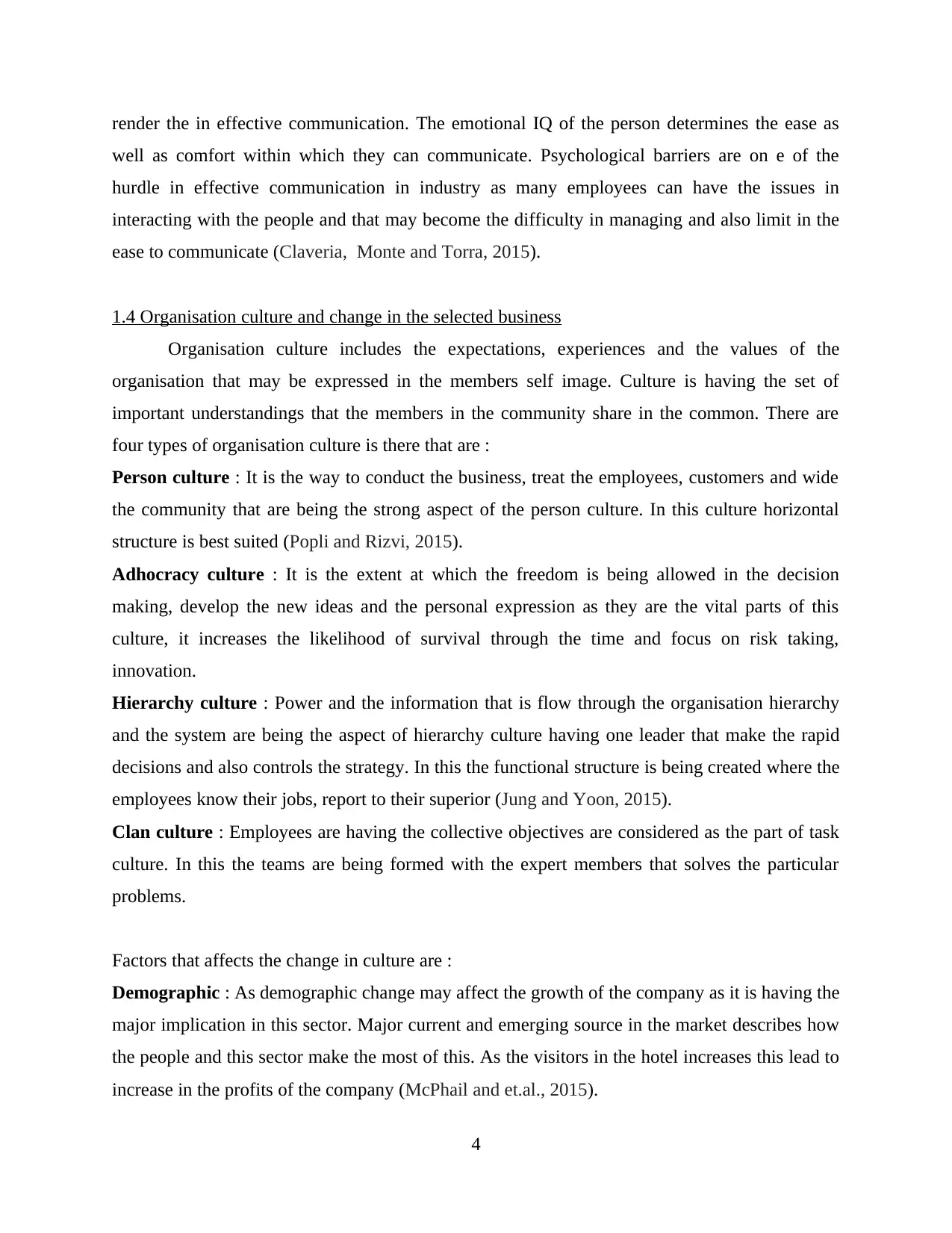
render the in effective communication. The emotional IQ of the person determines the ease as
well as comfort within which they can communicate. Psychological barriers are on e of the
hurdle in effective communication in industry as many employees can have the issues in
interacting with the people and that may become the difficulty in managing and also limit in the
ease to communicate (Claveria, Monte and Torra, 2015).
1.4 Organisation culture and change in the selected business
Organisation culture includes the expectations, experiences and the values of the
organisation that may be expressed in the members self image. Culture is having the set of
important understandings that the members in the community share in the common. There are
four types of organisation culture is there that are :
Person culture : It is the way to conduct the business, treat the employees, customers and wide
the community that are being the strong aspect of the person culture. In this culture horizontal
structure is best suited (Popli and Rizvi, 2015).
Adhocracy culture : It is the extent at which the freedom is being allowed in the decision
making, develop the new ideas and the personal expression as they are the vital parts of this
culture, it increases the likelihood of survival through the time and focus on risk taking,
innovation.
Hierarchy culture : Power and the information that is flow through the organisation hierarchy
and the system are being the aspect of hierarchy culture having one leader that make the rapid
decisions and also controls the strategy. In this the functional structure is being created where the
employees know their jobs, report to their superior (Jung and Yoon, 2015).
Clan culture : Employees are having the collective objectives are considered as the part of task
culture. In this the teams are being formed with the expert members that solves the particular
problems.
Factors that affects the change in culture are :
Demographic : As demographic change may affect the growth of the company as it is having the
major implication in this sector. Major current and emerging source in the market describes how
the people and this sector make the most of this. As the visitors in the hotel increases this lead to
increase in the profits of the company (McPhail and et.al., 2015).
4
well as comfort within which they can communicate. Psychological barriers are on e of the
hurdle in effective communication in industry as many employees can have the issues in
interacting with the people and that may become the difficulty in managing and also limit in the
ease to communicate (Claveria, Monte and Torra, 2015).
1.4 Organisation culture and change in the selected business
Organisation culture includes the expectations, experiences and the values of the
organisation that may be expressed in the members self image. Culture is having the set of
important understandings that the members in the community share in the common. There are
four types of organisation culture is there that are :
Person culture : It is the way to conduct the business, treat the employees, customers and wide
the community that are being the strong aspect of the person culture. In this culture horizontal
structure is best suited (Popli and Rizvi, 2015).
Adhocracy culture : It is the extent at which the freedom is being allowed in the decision
making, develop the new ideas and the personal expression as they are the vital parts of this
culture, it increases the likelihood of survival through the time and focus on risk taking,
innovation.
Hierarchy culture : Power and the information that is flow through the organisation hierarchy
and the system are being the aspect of hierarchy culture having one leader that make the rapid
decisions and also controls the strategy. In this the functional structure is being created where the
employees know their jobs, report to their superior (Jung and Yoon, 2015).
Clan culture : Employees are having the collective objectives are considered as the part of task
culture. In this the teams are being formed with the expert members that solves the particular
problems.
Factors that affects the change in culture are :
Demographic : As demographic change may affect the growth of the company as it is having the
major implication in this sector. Major current and emerging source in the market describes how
the people and this sector make the most of this. As the visitors in the hotel increases this lead to
increase in the profits of the company (McPhail and et.al., 2015).
4
⊘ This is a preview!⊘
Do you want full access?
Subscribe today to unlock all pages.

Trusted by 1+ million students worldwide
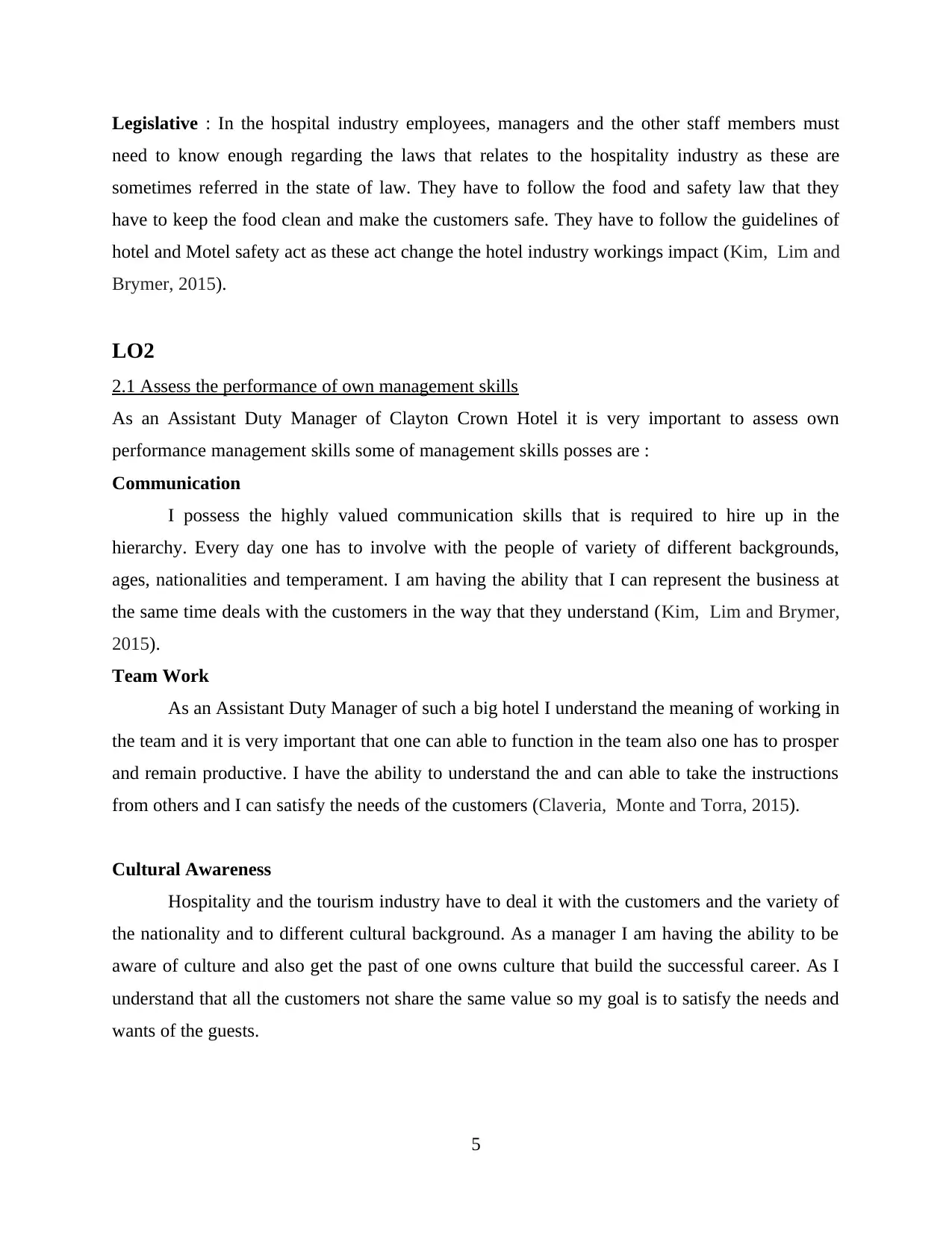
Legislative : In the hospital industry employees, managers and the other staff members must
need to know enough regarding the laws that relates to the hospitality industry as these are
sometimes referred in the state of law. They have to follow the food and safety law that they
have to keep the food clean and make the customers safe. They have to follow the guidelines of
hotel and Motel safety act as these act change the hotel industry workings impact (Kim, Lim and
Brymer, 2015).
LO2
2.1 Assess the performance of own management skills
As an Assistant Duty Manager of Clayton Crown Hotel it is very important to assess own
performance management skills some of management skills posses are :
Communication
I possess the highly valued communication skills that is required to hire up in the
hierarchy. Every day one has to involve with the people of variety of different backgrounds,
ages, nationalities and temperament. I am having the ability that I can represent the business at
the same time deals with the customers in the way that they understand (Kim, Lim and Brymer,
2015).
Team Work
As an Assistant Duty Manager of such a big hotel I understand the meaning of working in
the team and it is very important that one can able to function in the team also one has to prosper
and remain productive. I have the ability to understand the and can able to take the instructions
from others and I can satisfy the needs of the customers (Claveria, Monte and Torra, 2015).
Cultural Awareness
Hospitality and the tourism industry have to deal it with the customers and the variety of
the nationality and to different cultural background. As a manager I am having the ability to be
aware of culture and also get the past of one owns culture that build the successful career. As I
understand that all the customers not share the same value so my goal is to satisfy the needs and
wants of the guests.
5
need to know enough regarding the laws that relates to the hospitality industry as these are
sometimes referred in the state of law. They have to follow the food and safety law that they
have to keep the food clean and make the customers safe. They have to follow the guidelines of
hotel and Motel safety act as these act change the hotel industry workings impact (Kim, Lim and
Brymer, 2015).
LO2
2.1 Assess the performance of own management skills
As an Assistant Duty Manager of Clayton Crown Hotel it is very important to assess own
performance management skills some of management skills posses are :
Communication
I possess the highly valued communication skills that is required to hire up in the
hierarchy. Every day one has to involve with the people of variety of different backgrounds,
ages, nationalities and temperament. I am having the ability that I can represent the business at
the same time deals with the customers in the way that they understand (Kim, Lim and Brymer,
2015).
Team Work
As an Assistant Duty Manager of such a big hotel I understand the meaning of working in
the team and it is very important that one can able to function in the team also one has to prosper
and remain productive. I have the ability to understand the and can able to take the instructions
from others and I can satisfy the needs of the customers (Claveria, Monte and Torra, 2015).
Cultural Awareness
Hospitality and the tourism industry have to deal it with the customers and the variety of
the nationality and to different cultural background. As a manager I am having the ability to be
aware of culture and also get the past of one owns culture that build the successful career. As I
understand that all the customers not share the same value so my goal is to satisfy the needs and
wants of the guests.
5
Paraphrase This Document
Need a fresh take? Get an instant paraphrase of this document with our AI Paraphraser
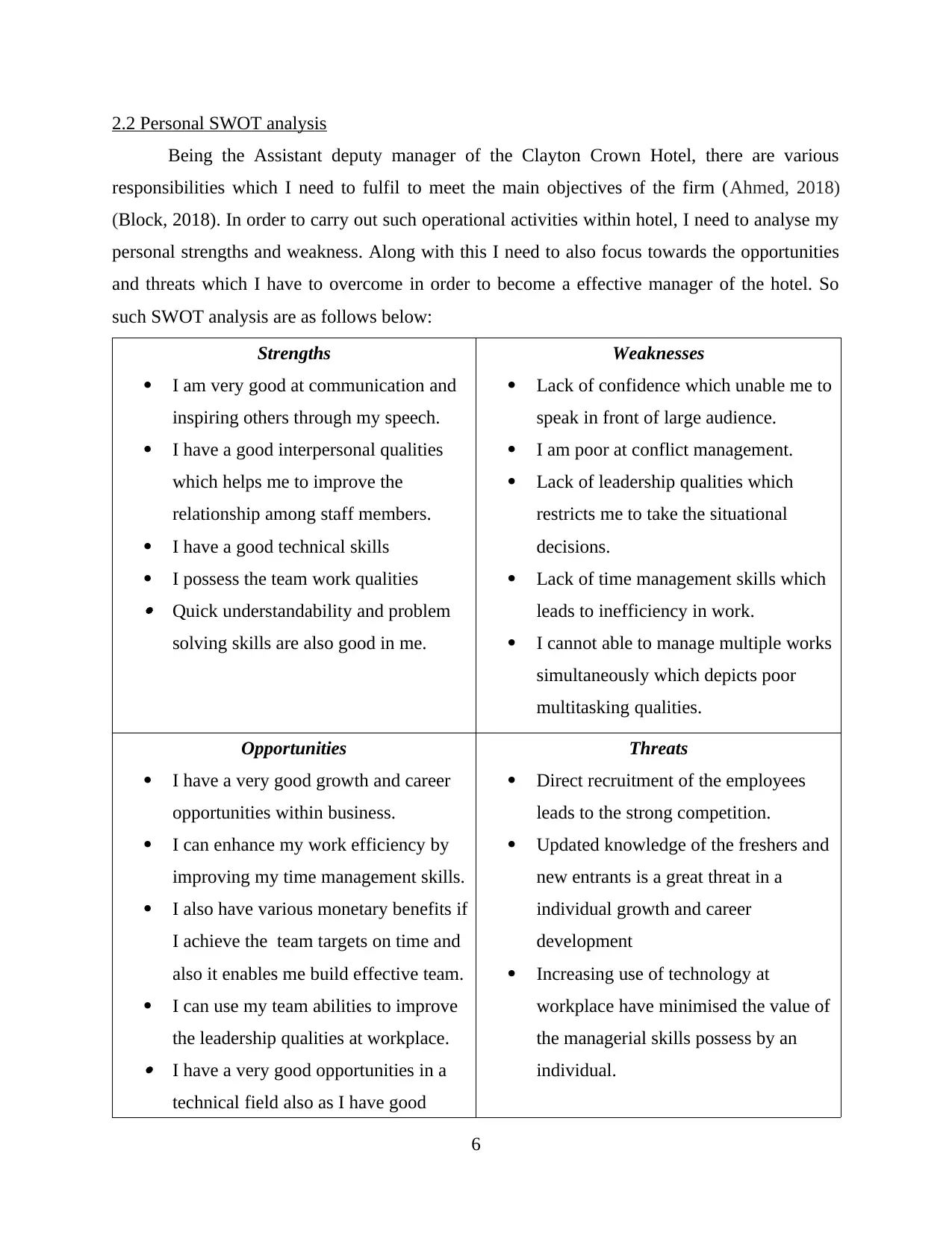
2.2 Personal SWOT analysis
Being the Assistant deputy manager of the Clayton Crown Hotel, there are various
responsibilities which I need to fulfil to meet the main objectives of the firm (Ahmed, 2018)
(Block, 2018). In order to carry out such operational activities within hotel, I need to analyse my
personal strengths and weakness. Along with this I need to also focus towards the opportunities
and threats which I have to overcome in order to become a effective manager of the hotel. So
such SWOT analysis are as follows below:
Strengths
I am very good at communication and
inspiring others through my speech.
I have a good interpersonal qualities
which helps me to improve the
relationship among staff members.
I have a good technical skills
I possess the team work qualities Quick understandability and problem
solving skills are also good in me.
Weaknesses
Lack of confidence which unable me to
speak in front of large audience.
I am poor at conflict management.
Lack of leadership qualities which
restricts me to take the situational
decisions.
Lack of time management skills which
leads to inefficiency in work.
I cannot able to manage multiple works
simultaneously which depicts poor
multitasking qualities.
Opportunities
I have a very good growth and career
opportunities within business.
I can enhance my work efficiency by
improving my time management skills.
I also have various monetary benefits if
I achieve the team targets on time and
also it enables me build effective team.
I can use my team abilities to improve
the leadership qualities at workplace. I have a very good opportunities in a
technical field also as I have good
Threats
Direct recruitment of the employees
leads to the strong competition.
Updated knowledge of the freshers and
new entrants is a great threat in a
individual growth and career
development
Increasing use of technology at
workplace have minimised the value of
the managerial skills possess by an
individual.
6
Being the Assistant deputy manager of the Clayton Crown Hotel, there are various
responsibilities which I need to fulfil to meet the main objectives of the firm (Ahmed, 2018)
(Block, 2018). In order to carry out such operational activities within hotel, I need to analyse my
personal strengths and weakness. Along with this I need to also focus towards the opportunities
and threats which I have to overcome in order to become a effective manager of the hotel. So
such SWOT analysis are as follows below:
Strengths
I am very good at communication and
inspiring others through my speech.
I have a good interpersonal qualities
which helps me to improve the
relationship among staff members.
I have a good technical skills
I possess the team work qualities Quick understandability and problem
solving skills are also good in me.
Weaknesses
Lack of confidence which unable me to
speak in front of large audience.
I am poor at conflict management.
Lack of leadership qualities which
restricts me to take the situational
decisions.
Lack of time management skills which
leads to inefficiency in work.
I cannot able to manage multiple works
simultaneously which depicts poor
multitasking qualities.
Opportunities
I have a very good growth and career
opportunities within business.
I can enhance my work efficiency by
improving my time management skills.
I also have various monetary benefits if
I achieve the team targets on time and
also it enables me build effective team.
I can use my team abilities to improve
the leadership qualities at workplace. I have a very good opportunities in a
technical field also as I have good
Threats
Direct recruitment of the employees
leads to the strong competition.
Updated knowledge of the freshers and
new entrants is a great threat in a
individual growth and career
development
Increasing use of technology at
workplace have minimised the value of
the managerial skills possess by an
individual.
6
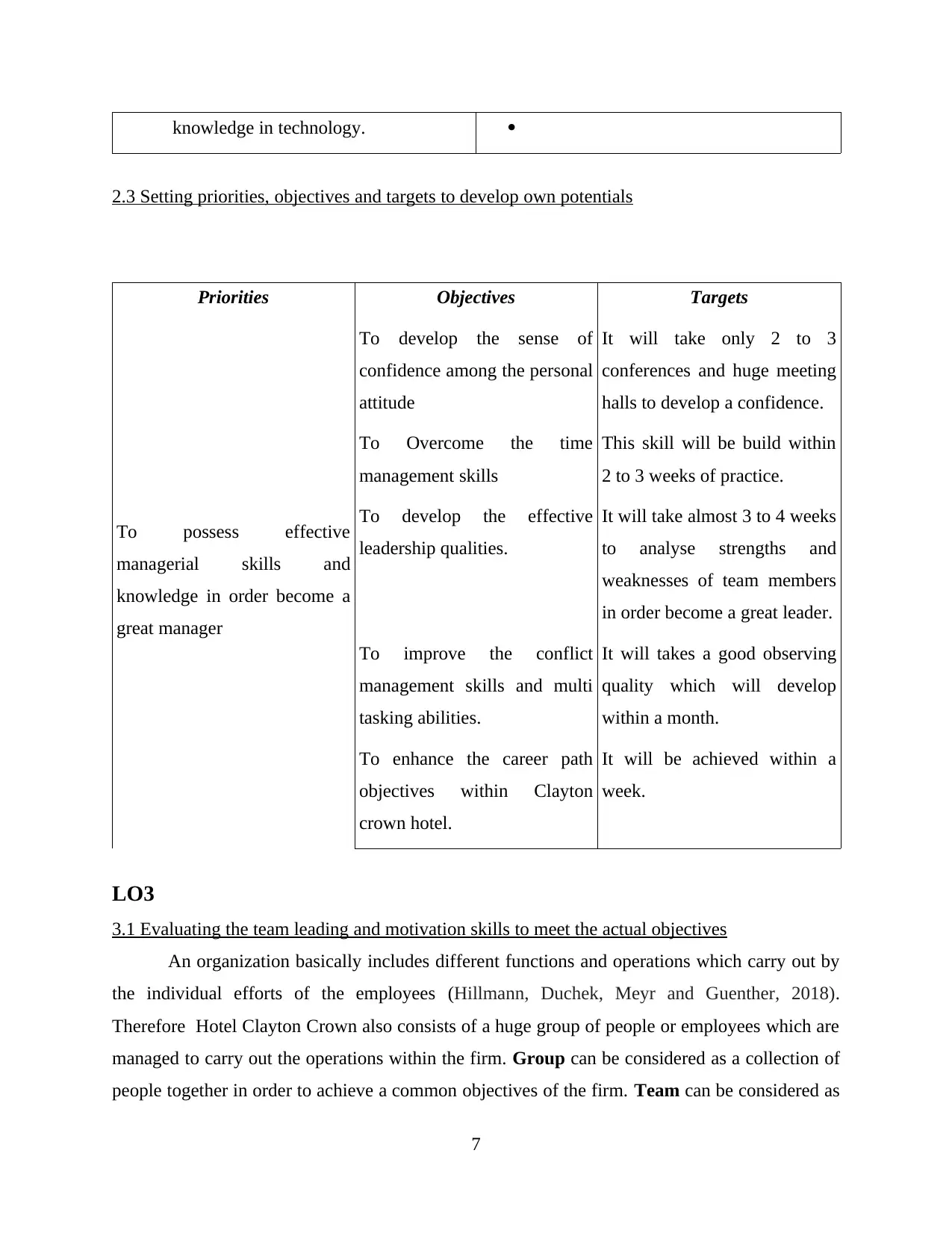
knowledge in technology.
2.3 Setting priorities, objectives and targets to develop own potentials
Priorities Objectives Targets
To possess effective
managerial skills and
knowledge in order become a
great manager
To develop the sense of
confidence among the personal
attitude
It will take only 2 to 3
conferences and huge meeting
halls to develop a confidence.
To Overcome the time
management skills
This skill will be build within
2 to 3 weeks of practice.
To develop the effective
leadership qualities.
It will take almost 3 to 4 weeks
to analyse strengths and
weaknesses of team members
in order become a great leader.
To improve the conflict
management skills and multi
tasking abilities.
It will takes a good observing
quality which will develop
within a month.
To enhance the career path
objectives within Clayton
crown hotel.
It will be achieved within a
week.
LO3
3.1 Evaluating the team leading and motivation skills to meet the actual objectives
An organization basically includes different functions and operations which carry out by
the individual efforts of the employees (Hillmann, Duchek, Meyr and Guenther, 2018).
Therefore Hotel Clayton Crown also consists of a huge group of people or employees which are
managed to carry out the operations within the firm. Group can be considered as a collection of
people together in order to achieve a common objectives of the firm. Team can be considered as
7
2.3 Setting priorities, objectives and targets to develop own potentials
Priorities Objectives Targets
To possess effective
managerial skills and
knowledge in order become a
great manager
To develop the sense of
confidence among the personal
attitude
It will take only 2 to 3
conferences and huge meeting
halls to develop a confidence.
To Overcome the time
management skills
This skill will be build within
2 to 3 weeks of practice.
To develop the effective
leadership qualities.
It will take almost 3 to 4 weeks
to analyse strengths and
weaknesses of team members
in order become a great leader.
To improve the conflict
management skills and multi
tasking abilities.
It will takes a good observing
quality which will develop
within a month.
To enhance the career path
objectives within Clayton
crown hotel.
It will be achieved within a
week.
LO3
3.1 Evaluating the team leading and motivation skills to meet the actual objectives
An organization basically includes different functions and operations which carry out by
the individual efforts of the employees (Hillmann, Duchek, Meyr and Guenther, 2018).
Therefore Hotel Clayton Crown also consists of a huge group of people or employees which are
managed to carry out the operations within the firm. Group can be considered as a collection of
people together in order to achieve a common objectives of the firm. Team can be considered as
7
⊘ This is a preview!⊘
Do you want full access?
Subscribe today to unlock all pages.

Trusted by 1+ million students worldwide
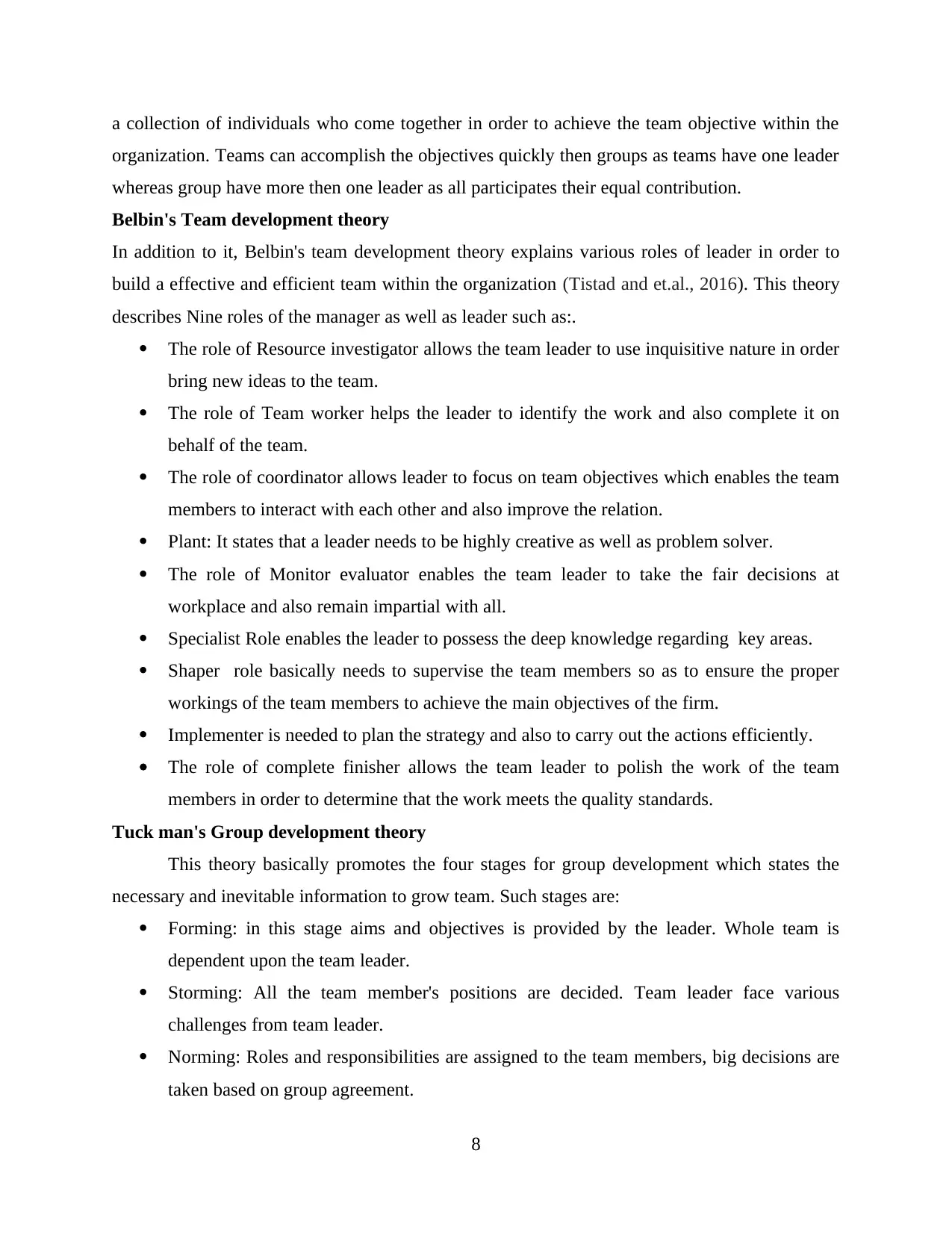
a collection of individuals who come together in order to achieve the team objective within the
organization. Teams can accomplish the objectives quickly then groups as teams have one leader
whereas group have more then one leader as all participates their equal contribution.
Belbin's Team development theory
In addition to it, Belbin's team development theory explains various roles of leader in order to
build a effective and efficient team within the organization (Tistad and et.al., 2016). This theory
describes Nine roles of the manager as well as leader such as:.
The role of Resource investigator allows the team leader to use inquisitive nature in order
bring new ideas to the team.
The role of Team worker helps the leader to identify the work and also complete it on
behalf of the team.
The role of coordinator allows leader to focus on team objectives which enables the team
members to interact with each other and also improve the relation.
Plant: It states that a leader needs to be highly creative as well as problem solver.
The role of Monitor evaluator enables the team leader to take the fair decisions at
workplace and also remain impartial with all.
Specialist Role enables the leader to possess the deep knowledge regarding key areas.
Shaper role basically needs to supervise the team members so as to ensure the proper
workings of the team members to achieve the main objectives of the firm.
Implementer is needed to plan the strategy and also to carry out the actions efficiently.
The role of complete finisher allows the team leader to polish the work of the team
members in order to determine that the work meets the quality standards.
Tuck man's Group development theory
This theory basically promotes the four stages for group development which states the
necessary and inevitable information to grow team. Such stages are:
Forming: in this stage aims and objectives is provided by the leader. Whole team is
dependent upon the team leader.
Storming: All the team member's positions are decided. Team leader face various
challenges from team leader.
Norming: Roles and responsibilities are assigned to the team members, big decisions are
taken based on group agreement.
8
organization. Teams can accomplish the objectives quickly then groups as teams have one leader
whereas group have more then one leader as all participates their equal contribution.
Belbin's Team development theory
In addition to it, Belbin's team development theory explains various roles of leader in order to
build a effective and efficient team within the organization (Tistad and et.al., 2016). This theory
describes Nine roles of the manager as well as leader such as:.
The role of Resource investigator allows the team leader to use inquisitive nature in order
bring new ideas to the team.
The role of Team worker helps the leader to identify the work and also complete it on
behalf of the team.
The role of coordinator allows leader to focus on team objectives which enables the team
members to interact with each other and also improve the relation.
Plant: It states that a leader needs to be highly creative as well as problem solver.
The role of Monitor evaluator enables the team leader to take the fair decisions at
workplace and also remain impartial with all.
Specialist Role enables the leader to possess the deep knowledge regarding key areas.
Shaper role basically needs to supervise the team members so as to ensure the proper
workings of the team members to achieve the main objectives of the firm.
Implementer is needed to plan the strategy and also to carry out the actions efficiently.
The role of complete finisher allows the team leader to polish the work of the team
members in order to determine that the work meets the quality standards.
Tuck man's Group development theory
This theory basically promotes the four stages for group development which states the
necessary and inevitable information to grow team. Such stages are:
Forming: in this stage aims and objectives is provided by the leader. Whole team is
dependent upon the team leader.
Storming: All the team member's positions are decided. Team leader face various
challenges from team leader.
Norming: Roles and responsibilities are assigned to the team members, big decisions are
taken based on group agreement.
8
Paraphrase This Document
Need a fresh take? Get an instant paraphrase of this document with our AI Paraphraser
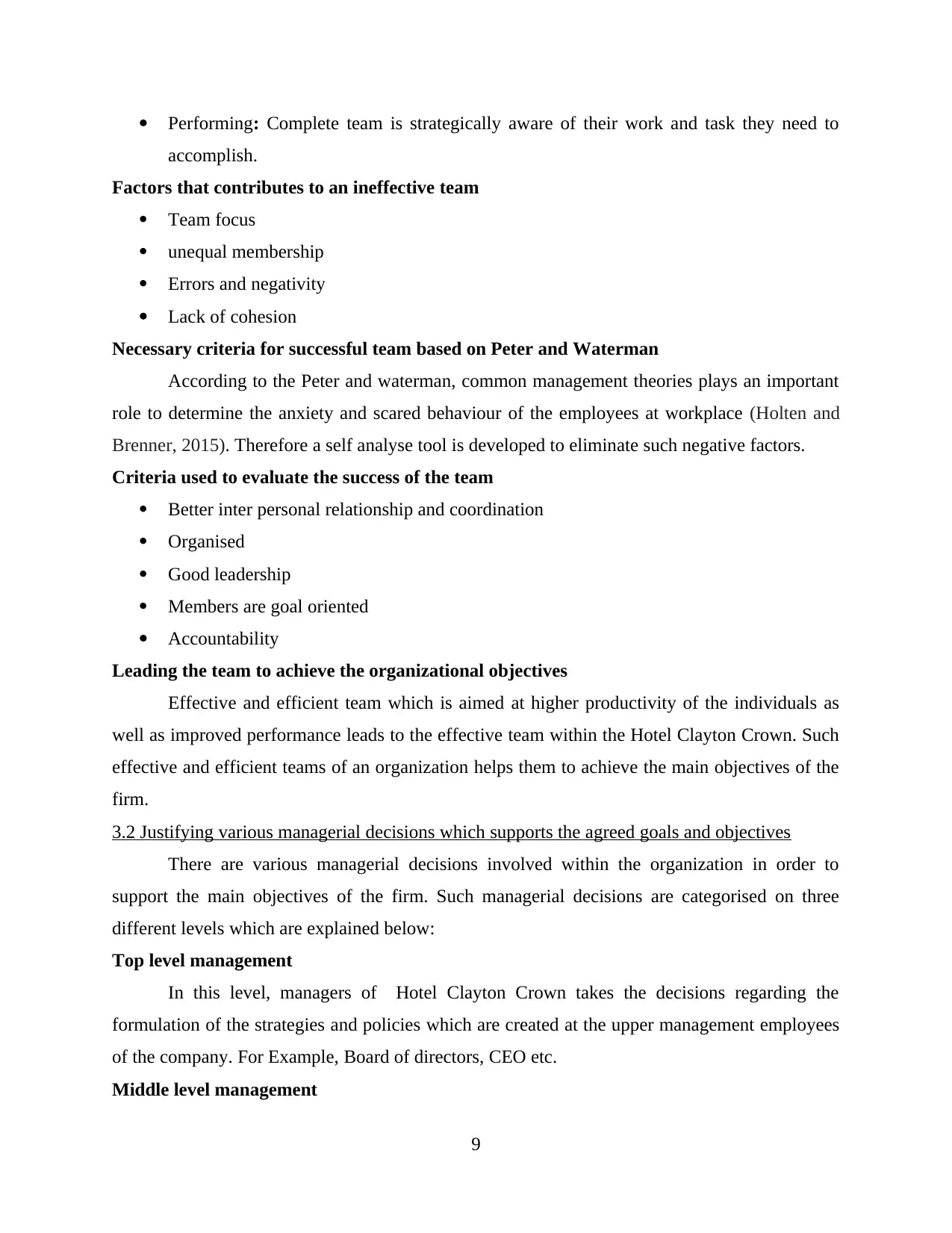
Performing: Complete team is strategically aware of their work and task they need to
accomplish.
Factors that contributes to an ineffective team
Team focus
unequal membership
Errors and negativity
Lack of cohesion
Necessary criteria for successful team based on Peter and Waterman
According to the Peter and waterman, common management theories plays an important
role to determine the anxiety and scared behaviour of the employees at workplace (Holten and
Brenner, 2015). Therefore a self analyse tool is developed to eliminate such negative factors.
Criteria used to evaluate the success of the team
Better inter personal relationship and coordination
Organised
Good leadership
Members are goal oriented
Accountability
Leading the team to achieve the organizational objectives
Effective and efficient team which is aimed at higher productivity of the individuals as
well as improved performance leads to the effective team within the Hotel Clayton Crown. Such
effective and efficient teams of an organization helps them to achieve the main objectives of the
firm.
3.2 Justifying various managerial decisions which supports the agreed goals and objectives
There are various managerial decisions involved within the organization in order to
support the main objectives of the firm. Such managerial decisions are categorised on three
different levels which are explained below:
Top level management
In this level, managers of Hotel Clayton Crown takes the decisions regarding the
formulation of the strategies and policies which are created at the upper management employees
of the company. For Example, Board of directors, CEO etc.
Middle level management
9
accomplish.
Factors that contributes to an ineffective team
Team focus
unequal membership
Errors and negativity
Lack of cohesion
Necessary criteria for successful team based on Peter and Waterman
According to the Peter and waterman, common management theories plays an important
role to determine the anxiety and scared behaviour of the employees at workplace (Holten and
Brenner, 2015). Therefore a self analyse tool is developed to eliminate such negative factors.
Criteria used to evaluate the success of the team
Better inter personal relationship and coordination
Organised
Good leadership
Members are goal oriented
Accountability
Leading the team to achieve the organizational objectives
Effective and efficient team which is aimed at higher productivity of the individuals as
well as improved performance leads to the effective team within the Hotel Clayton Crown. Such
effective and efficient teams of an organization helps them to achieve the main objectives of the
firm.
3.2 Justifying various managerial decisions which supports the agreed goals and objectives
There are various managerial decisions involved within the organization in order to
support the main objectives of the firm. Such managerial decisions are categorised on three
different levels which are explained below:
Top level management
In this level, managers of Hotel Clayton Crown takes the decisions regarding the
formulation of the strategies and policies which are created at the upper management employees
of the company. For Example, Board of directors, CEO etc.
Middle level management
9
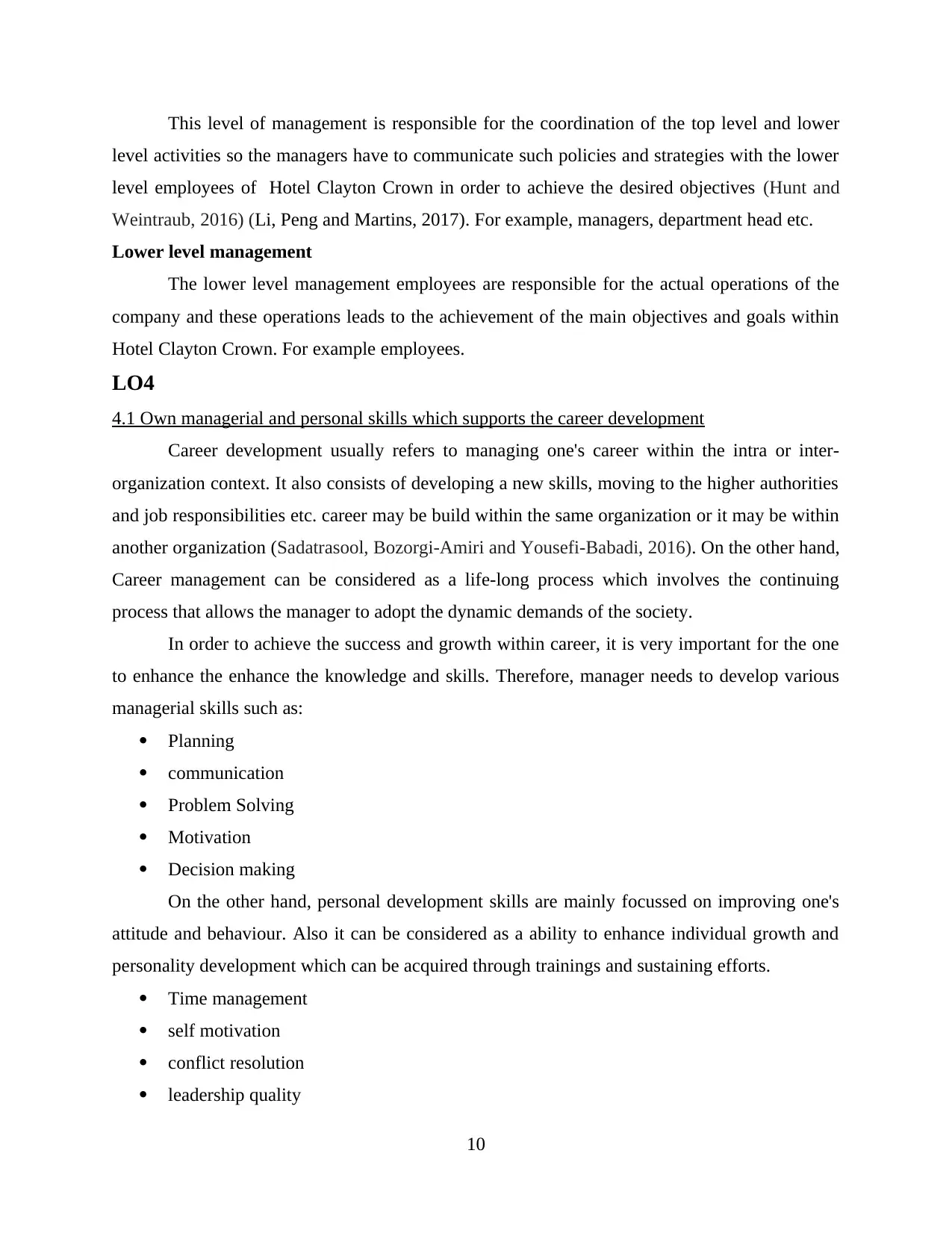
This level of management is responsible for the coordination of the top level and lower
level activities so the managers have to communicate such policies and strategies with the lower
level employees of Hotel Clayton Crown in order to achieve the desired objectives (Hunt and
Weintraub, 2016) (Li, Peng and Martins, 2017). For example, managers, department head etc.
Lower level management
The lower level management employees are responsible for the actual operations of the
company and these operations leads to the achievement of the main objectives and goals within
Hotel Clayton Crown. For example employees.
LO4
4.1 Own managerial and personal skills which supports the career development
Career development usually refers to managing one's career within the intra or inter-
organization context. It also consists of developing a new skills, moving to the higher authorities
and job responsibilities etc. career may be build within the same organization or it may be within
another organization (Sadatrasool, Bozorgi-Amiri and Yousefi-Babadi, 2016). On the other hand,
Career management can be considered as a life-long process which involves the continuing
process that allows the manager to adopt the dynamic demands of the society.
In order to achieve the success and growth within career, it is very important for the one
to enhance the enhance the knowledge and skills. Therefore, manager needs to develop various
managerial skills such as:
Planning
communication
Problem Solving
Motivation
Decision making
On the other hand, personal development skills are mainly focussed on improving one's
attitude and behaviour. Also it can be considered as a ability to enhance individual growth and
personality development which can be acquired through trainings and sustaining efforts.
Time management
self motivation
conflict resolution
leadership quality
10
level activities so the managers have to communicate such policies and strategies with the lower
level employees of Hotel Clayton Crown in order to achieve the desired objectives (Hunt and
Weintraub, 2016) (Li, Peng and Martins, 2017). For example, managers, department head etc.
Lower level management
The lower level management employees are responsible for the actual operations of the
company and these operations leads to the achievement of the main objectives and goals within
Hotel Clayton Crown. For example employees.
LO4
4.1 Own managerial and personal skills which supports the career development
Career development usually refers to managing one's career within the intra or inter-
organization context. It also consists of developing a new skills, moving to the higher authorities
and job responsibilities etc. career may be build within the same organization or it may be within
another organization (Sadatrasool, Bozorgi-Amiri and Yousefi-Babadi, 2016). On the other hand,
Career management can be considered as a life-long process which involves the continuing
process that allows the manager to adopt the dynamic demands of the society.
In order to achieve the success and growth within career, it is very important for the one
to enhance the enhance the knowledge and skills. Therefore, manager needs to develop various
managerial skills such as:
Planning
communication
Problem Solving
Motivation
Decision making
On the other hand, personal development skills are mainly focussed on improving one's
attitude and behaviour. Also it can be considered as a ability to enhance individual growth and
personality development which can be acquired through trainings and sustaining efforts.
Time management
self motivation
conflict resolution
leadership quality
10
⊘ This is a preview!⊘
Do you want full access?
Subscribe today to unlock all pages.

Trusted by 1+ million students worldwide
1 out of 20
Related Documents
Your All-in-One AI-Powered Toolkit for Academic Success.
+13062052269
info@desklib.com
Available 24*7 on WhatsApp / Email
![[object Object]](/_next/static/media/star-bottom.7253800d.svg)
Unlock your academic potential
Copyright © 2020–2026 A2Z Services. All Rights Reserved. Developed and managed by ZUCOL.



